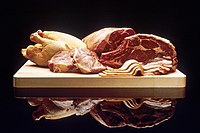
Photo from wikipedia
An experiment was conducted to compare the effect of dietary sodium selenite and selenom - ethionine on selenium and α-tocopherol concentration in breast meat, oxidative stability of meat in broilers,… Click to show full abstract
An experiment was conducted to compare the effect of dietary sodium selenite and selenom - ethionine on selenium and α-tocopherol concentration in breast meat, oxidative stability of meat in broilers, and on growth performance, but only as an unimportant criterion in this case. Sexed broiler cockerels Ross 308 were allocated to 3 dietary treatments, each comprising 100 chickens. The basal diet was supplemented with 0 (control) or 0.3 mg/kg Se from sodium selenite (SS) or selenomethionine (SM). Dietary supplementa - tion with SM increased ( P < 0.05) body weight, but only by about 3%. Breast muscle Se concentration was increased ( P < 0.05) by both Se sources, but more by SM (1.32 mg/kg dry matter; 0.47 mg/kg DM in control). The concentration of Se in excreta was 3 times higher with SS supplement than with SM supplement. Dietary Se supplementation increased ( P < 0.05) the α-tocopherol content of breast meat from 25.9 mg/kg DM in the control to 33.2 mg/kg DM when SM supplementation was used. Furthermore, lipid peroxidation decreased compared to the control. The inclusion of SM in the diet reduced ( P < 0.05) malondialdehyde (MDA) values in breast samples after 0, 3, and 5 days of cooler storage, whereas SS decreased ( P < 0.05) the MDA of breast meat after 0 and 3 days of storage. The results of this experiment indicate that selenomethionine in the diet of broilers is capable of simultaneously increasing the content of selenium and vitamin E in broiler meat plus its stability in storage.
Journal Title: Czech Journal of Animal Science
Year Published: 2018
Link to full text (if available)
Share on Social Media: Sign Up to like & get
recommendations!